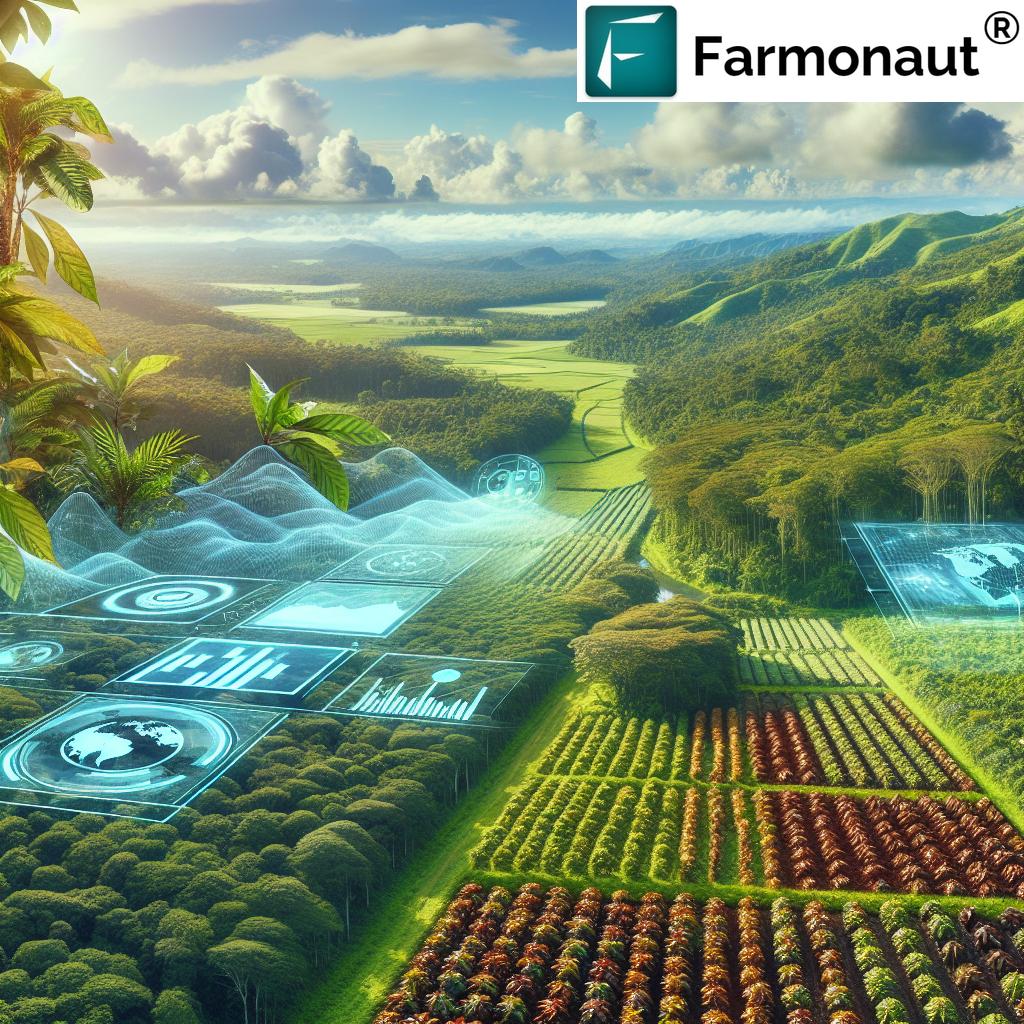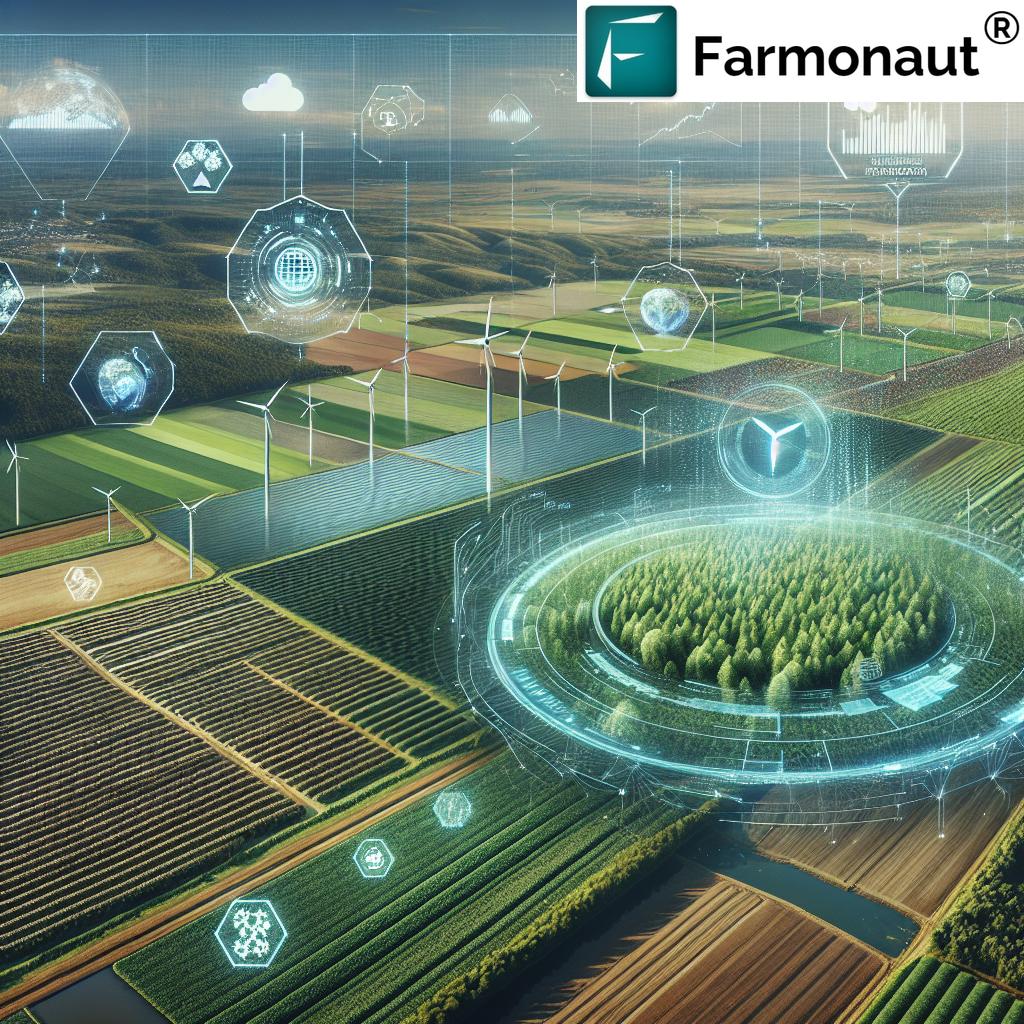EUDR 2025: Revolutionizing EU Agricultural Imports for Sustainable Farming and Forest Conservation

“The EUDR 2025 will impact 6 key agricultural commodities, including cocoa, coffee, and palm oil, to combat deforestation.”
In the ever-evolving landscape of global agriculture and environmental conservation, a groundbreaking regulation is set to transform the way we approach sustainable farming and forest preservation. The European Union Deforestation Regulation (EUDR), slated for implementation in 2025, stands as a pivotal milestone in our collective journey towards a more sustainable and ethically sourced agricultural future.
At Farmonaut, we’re at the forefront of agricultural technology, providing innovative solutions that align perfectly with the goals of EUDR 2025. Our satellite-based farm management solutions, accessible via  , Android, and iOS platforms, are designed to empower farmers and agribusinesses in their quest for sustainable practices.
, Android, and iOS platforms, are designed to empower farmers and agribusinesses in their quest for sustainable practices.
In this comprehensive blog post, we’ll explore the far-reaching implications of EUDR 2025, delving into its impact on agricultural commodities, supply chain transparency, and the future of farming. We’ll uncover how this regulation is set to revolutionize EU agricultural imports while promoting sustainable agriculture practices and forest conservation strategies.
Understanding EUDR 2025: A Game-Changer for Sustainable Agriculture
The European Union Deforestation Regulation (EUDR) is a landmark initiative aimed at curbing deforestation and forest degradation linked to agricultural commodities imported into the EU. Set to take effect in 2025, this regulation will significantly impact the global agricultural landscape, particularly affecting sectors such as cocoa, coffee, palm oil, soy, beef, and timber.
- Key Objectives of EUDR 2025:
- Prevent deforestation-linked products from entering the EU market
- Promote sustainable supply chains
- Enhance transparency in global agricultural trade
- Protect biodiversity and combat climate change
As we navigate this new regulatory landscape, technologies like those offered by Farmonaut become increasingly crucial. Our API and API Developer Docs provide powerful tools for integrating sustainable farming practices into existing agricultural systems.
The Impact of EUDR on Agricultural Commodities
The EUDR 2025 will have a profound effect on various agricultural sectors. Let’s examine how different commodities will be impacted:
| Agricultural Commodity | Estimated Annual EU Import Volume (tons) | Primary Exporting Countries | Deforestation Risk Level | Key EUDR Compliance Challenges | Potential Sustainable Solutions |
|---|---|---|---|---|---|
| Cocoa | 1,500,000 | Côte d’Ivoire, Ghana, Nigeria | High | Traceability, smallholder inclusion | Satellite monitoring, agroforestry |
| Palm Oil | 6,500,000 | Indonesia, Malaysia | High | Large-scale deforestation, peatland conversion | Sustainable certification, yield improvement |
| Soy | 33,000,000 | Brazil, Argentina, USA | Medium | Indirect land-use change, complex supply chains | Precision agriculture, crop rotation |
| Beef | 200,000 | Brazil, Argentina, Uruguay | High | Cattle ranching expansion, traceability | Intensification, pasture management |
| Timber | 20,000,000 | Russia, USA, Ukraine | Medium | Illegal logging, complex supply chains | Sustainable forestry, blockchain traceability |
This table highlights the complexity of the challenges faced by different agricultural sectors. At Farmonaut, we’re committed to providing solutions that address these challenges head-on. Our satellite-based crop health monitoring and AI-driven advisory systems are particularly valuable for commodities like cocoa and palm oil, where traceability and sustainable practices are crucial.
Supply Chain Transparency: A Core Focus of EUDR
One of the primary objectives of EUDR 2025 is to enhance supply chain transparency in agriculture. This focus aligns perfectly with Farmonaut’s mission to make precision agriculture accessible and transparent.
- Key aspects of supply chain transparency under EUDR:
- Traceability of products from source to EU market
- Due diligence requirements for operators
- Verification of deforestation-free claims
- Increased accountability for all supply chain actors
Farmonaut’s blockchain-based traceability solutions are at the forefront of this transparency revolution. By leveraging our technology, businesses can ensure compliance with EUDR requirements while building trust with consumers and regulatory bodies.
Climate Change Mitigation in Farming: EUDR’s Environmental Impact
EUDR 2025 is not just about regulating imports; it’s a significant step towards mitigating climate change through responsible agricultural practices. The regulation aims to protect forests, which are crucial carbon sinks, thereby contributing to global climate goals.
“The EU’s new deforestation regulation aims to protect over 71,000 square kilometers of forest annually, equivalent to Ireland’s size.”
- Climate change mitigation strategies under EUDR:
- Reducing agricultural expansion into forested areas
- Promoting sustainable intensification of existing farmlands
- Encouraging agroforestry and other carbon-sequestering practices
- Supporting the transition to climate-smart agriculture
At Farmonaut, we’re dedicated to supporting these climate-smart initiatives. Our satellite-based monitoring and AI advisory systems help farmers optimize their resource use, reducing the need for expansion while improving yields on existing farmland.
Agricultural Commodity Sustainability: A New Era
EUDR 2025 marks the beginning of a new era in agricultural commodity sustainability. It sets a precedent for other regions and pushes the global agricultural sector towards more responsible practices.
- Key aspects of commodity sustainability under EUDR:
- Emphasis on sustainable production methods
- Promotion of agroecological approaches
- Focus on biodiversity conservation
- Encouragement of regenerative agriculture practices
Farmonaut’s technologies are perfectly positioned to support this shift towards sustainability. Our precision agriculture tools, including our  and
and  , enable farmers to optimize their practices for both productivity and sustainability.
, enable farmers to optimize their practices for both productivity and sustainability.
Forest Conservation Strategies: The Heart of EUDR
At its core, EUDR 2025 is about preserving our planet’s forests. The regulation recognizes the critical role that forests play in biodiversity, climate regulation, and the livelihoods of millions.
- Key forest conservation strategies promoted by EUDR:
- Zero-deforestation commitments from suppliers
- Support for community-based forest management
- Promotion of sustainable forest products
- Investment in reforestation and afforestation projects
Farmonaut’s satellite monitoring capabilities play a crucial role in these conservation efforts. Our technology can help track forest cover, detect illegal deforestation, and support sustainable forest management practices.
Ethical Sourcing of Agricultural Products: A EUDR Priority
EUDR 2025 places a strong emphasis on ethical sourcing, recognizing that sustainable agriculture is not just about environmental protection but also about social responsibility.
- Key aspects of ethical sourcing under EUDR:
- Respect for land rights of local communities
- Fair labor practices in agricultural production
- Support for smallholder farmers
- Promotion of gender equality in agriculture
Farmonaut’s commitment to making precision agriculture accessible aligns perfectly with these ethical sourcing goals. Our affordable solutions help level the playing field for smallholder farmers, enabling them to compete in a global market while adhering to sustainable practices.
Human Rights in Agricultural Communities: EUDR’s Social Dimension
EUDR 2025 recognizes the intrinsic link between forest conservation, sustainable agriculture, and human rights. The regulation aims to protect the rights of indigenous peoples and local communities who depend on forests for their livelihoods.
- Human rights considerations in EUDR:
- Protection of indigenous land rights
- Ensuring Free, Prior and Informed Consent (FPIC)
- Safeguarding traditional knowledge and practices
- Promoting inclusive decision-making processes
At Farmonaut, we believe that technological advancements should benefit all stakeholders in the agricultural sector. Our tools are designed to be inclusive, empowering farmers of all scales to adopt sustainable practices and improve their livelihoods.
Agritech Solutions for Sustainable Farming: Farmonaut’s Role
As we move towards the implementation of EUDR 2025, agritech solutions will play a crucial role in enabling compliance and promoting sustainable farming practices. Farmonaut is at the forefront of this technological revolution in agriculture.
- Farmonaut’s contributions to sustainable farming:
- Satellite-based crop health monitoring for optimized resource use
- AI-driven advisory systems for precision agriculture
- Blockchain-based traceability for transparent supply chains
- Carbon footprint tracking for environmental impact assessment
Our technologies are designed to support farmers, agribusinesses, and policymakers in their efforts to comply with EUDR requirements while improving agricultural productivity and sustainability.
The Future of EU Agricultural Imports: A Sustainable Vision
As we look towards 2025 and beyond, it’s clear that EUDR will reshape the landscape of EU agricultural imports. This regulation sets a new standard for sustainability and ethical sourcing that will likely influence global agricultural practices.
- Key trends shaping the future of EU agricultural imports:
- Increased demand for certified sustainable products
- Growth in regenerative and climate-smart agriculture
- Expansion of traceability technologies across supply chains
- Rise of collaborative platforms for sustainable sourcing
Farmonaut is committed to being a key player in this sustainable future. Our ongoing research and development efforts are focused on creating innovative solutions that will help the agricultural sector meet and exceed the requirements of EUDR 2025.
Conclusion: Embracing a Sustainable Agricultural Future
The European Union Deforestation Regulation (EUDR) 2025 represents a significant step towards a more sustainable and responsible global agricultural system. By focusing on forest conservation, supply chain transparency, and ethical sourcing, EUDR is set to transform the way we approach farming and food production.
At Farmonaut, we’re excited to be part of this transformation. Our satellite-based farm management solutions, AI-driven advisory systems, and blockchain traceability tools are perfectly aligned with the goals of EUDR. We’re committed to supporting farmers, agribusinesses, and policymakers in their journey towards sustainable agriculture.
As we move towards 2025, the challenges are significant, but so are the opportunities. By embracing innovative technologies and collaborative approaches, we can create a future where agriculture not only feeds the world but also protects our forests, supports local communities, and mitigates climate change.
Together, let’s cultivate a sustainable future for agriculture, one farm at a time.
FAQs about EUDR 2025 and Sustainable Agriculture
- What is EUDR 2025?
EUDR 2025 is the European Union Deforestation Regulation set to be implemented in 2025. It aims to prevent the import of products linked to deforestation and forest degradation into the EU market. - Which agricultural commodities are affected by EUDR?
The main commodities affected include cocoa, coffee, palm oil, soy, beef, and timber. - How does EUDR impact global supply chains?
EUDR requires enhanced traceability and due diligence in supply chains, ensuring that products entering the EU market are deforestation-free. - What role does technology play in EUDR compliance?
Technologies like satellite monitoring, blockchain traceability, and AI-driven advisory systems play crucial roles in enabling compliance with EUDR requirements. - How does EUDR contribute to climate change mitigation?
By preventing deforestation-linked imports, EUDR helps protect forests, which are crucial carbon sinks, thus contributing to global climate goals.




